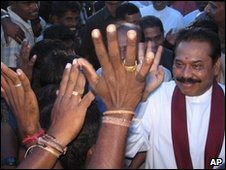 Sri Lankan President Mahinda Rajapaksa has proposed power-sharing arrangements for minority Tamils ahead of a key presidential vote later this month.
Sri Lankan President Mahinda Rajapaksa has proposed power-sharing arrangements for minority Tamils ahead of a key presidential vote later this month.
He said on Tuesday that he wants to create a second chamber in parliament to allow more Tamil representatives which will have a say in law-making.
The president also announced a $4bn fund to rebuild the island nation’s war-shattered north.
Correspondents say that the Tamil vote could be decisive in the election.
Both President Rajapaksa and his chief rival, former army General Sarath Fonseka, are eager to win Tamil support in the event the majority Sinhalese vote is split between them.
Last week the the Tamil National Alliance (TNA) – which has 22 seats in the 225-member parliament – announced its support for Gen Fonseka.
Tamil support
"The end of the war does not mean the end of the conflict," President Rajapaksa told foreign reporters at his Temple Trees residence in Colombo.
"We need to politically address the needs of Tamils," he said.
The president said that although the All Party Representative Committee (APRC) was supposed to be drawing up proposals on how Tamil people could be integrated into the political process, he wanted to pre-empt their conclusions by suggesting this power-sharing deal.
Correspondents say that a bicameral chamber has existed before in Sri Lanka but was abolished in the late 1970s.
They say that the focus of the presidential campaign now seems to be a contest between the two main contenders as to who can offer the most to the Tamil community.
The votes of Sri Lanka’s 2.5 million Tamils – who make about about 12.5% of the population – could be critical for the outcome.
Both men have been on the campaign trail in the northern Tamil heartland of Jaffna – a turn of events which correspondents say would have been unimaginable a year ago, when fighting raged between Tamil Tigers and government troops elsewhere in the north.
Rebuilding
The Tamil Tiger rebels were defeated by the army in May, ending 26 years of civil war. They were fighting for a separate homeland for Sri Lanka’s ethnic Tamils.
President Rajapaksa said that the $4bn fund would be a mix of government and donor funds, and will be spent in 2010 to rebuild railways, power generation and irrigation infrastructure.
"We have already signed $3bn within the next three years for eastern development," he said, referring to the areas the government recaptured from the Tigers in 2007.
The president has repeatedly promised a revival of the Tamil heartland in the country’s north and east, which sustained considerable damage during the course fo the war.
But correspondents say that so far he has struggled to win strong Tamil political support, partly because thousands of Tamils are still awaiting full resettlement from camps which human rights groups have condemned as being inadequate and too restrictive.
Asked if there was any possibility that Tamil Tiger supporters could regroup, President Rajapaksa said the rebels had been defeated militarily.
(For updates you can share with your friends, follow TNN on Facebook and Twitter )
